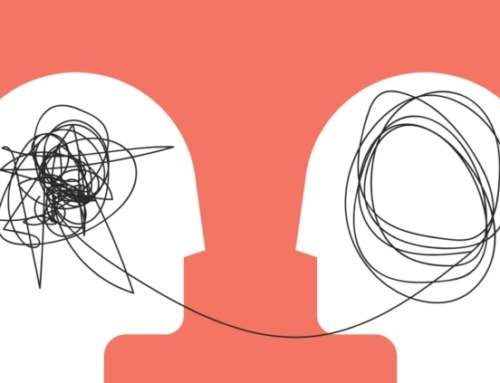Below I go on at length about an imagined scenario in a restaurant. Directly, it has nothing to do with our clinical interactions with our patients. But indirectly, it demonstrates how much is communicated and how much effect subtle changes in communication have on the relationship between two people, and also how much of what is not communicated also can have important effects on the relationship, for good or ill.
Let’s start. Imagine the following scene: you’re in a fancy restaurant, and as your waiter is bringing you the creamy tomato soup you ordered, he trips and the soup goes splashing all over your fancy clothes. He rights himself and says, “I’m sorry, it’s my fault.”
This is an unfortunate but common enough scene, and the waiter’s response seems expected enough. It’s socially appropriate to apologize by saying, “I’m sorry,” but let’s consider why he added, “It’s my fault.” The answer is that there are two levels of mutual knowing present before he adds, “It’s my fault,” and by adding it, he adds a third level of mutual knowing. Let me number the levels of mutual knowing:
- 1: You and he individually witness his spilling soup on you. So, you both know that he spilled soup on you (and also that you played no role in the spilling).
- 2: You and he also both know that the other of you witnessed what happened. So, you both know that you both know that he spilled soup on you (and that you had nothing to do with it).
But what’s missing here? You both know that you both know what happened, AND you both know it was his fault. But without his adding, “It was my fault,” YOU don’t know if HE knows or is willing to take responsibility for it being his fault. So:
- 3: By adding, “It’s my fault,” he is letting YOU know that HE takes responsibility, so now you both know.
As you can imagine, if this interaction really occurred in a restaurant, it isn’t finished yet. Ask yourself, what next needs to be communicated between you two? Following on his last statement, “I’m sorry. It’s my fault”, what are you likely to say?
- 4: You might say, “It’s ok. Things like this happen.” Perhaps you add, “It could happen to anyone.”
Before we move on, if you had added the last part, why did you do so? One likely explanation is because you are concerned about the waiter feeling bad about his spilling soup on you, and you wish to soften what you assume can be a punitive self-assessment towards himself. But also notice that when you send out this verbal “let me make this easier on you” communication, you in turn expect him to communicate gratefulness in response and perhaps even increased solicitousness towards your needs. For example, you would want to hear something like,
- 5: “Yes, I guess it could happen to anyone. I appreciate you saying so. But now, let’s focus on you and getting cleaned up.”
And, following this, you likely expect him to offer to pay your dry-cleaning bill. So, when you added, “It could happen to anyone, you were communicating both 1) kindness and 2) an expectation of reciprocity on his part through his demonstration of gratefulness and solicitousness.
Now let’s imagine a different series of communications. Let’s return to level 3. Instead of him saying after spilling the soup on you, “I’m sorry. It’s my fault,” he says,
- 3 Alternate: “I’m sorry. Let me get you some napkins to get you all cleaned up.”
How would you feel now? He did say “I’m sorry,” so why does it feel like that was NOT enough given how much damage he did to your clothes and evening? It could feel insufficient because 1) he did not explicitly take responsibility for the soup-spilling, and 2) by not taking responsibility, his statement could have come out of his mouth in the case of a child who spilled soup all over itself. In this alternate version, you’d probably feel somewhere between mildly irritated and furious.
Or let’s imagine that at level 3, he did respond with the original, more socially appropriate, statement. But then at level 4, instead of saying, “Yes, I guess it could happen to anyone. I appreciate you saying so. But now, let’s focus on you and getting cleaned up,” he said:
- 4 Alternate: “Yes, it could happen to anyone. But now, let’s focus on you and getting cleaned up.”
Notice how your act of kindness towards him calls for a reciprocating act of gratitude and perhaps a greater solicitousness from him. But none of those seem to be communicated by this alternative communication. And it’s irritating when it doesn’t come.
And last, if after these exchanges, you are left to ask to get your dry-cleaning bill taken care of, you would also likely find that unacceptable. Since he caused harm, it should be up to him to offer compensation without you having to ask for it, gosh darn it!.
Now we’re ready to segue to clinician-patient communication. I included a first scenario today, and I’m thinking up other ones for future posts.
Clinical Communication Scenario
The patient you’ve been seeing twice monthly for combined med admin and supportive therapy is late for her appointment for the third time in a row. Each time she apologizes for being late and provides a ‘good’ reason for running late.
- 1: “I’m sorry to be late again. My sister called with an emergency, and I just couldn’t let her stay so upset. So, I had to talk her down a bit. But that took some time.”
So, the patient both apologizes and provides a plausible explanation that also, you notice, is hard to rebut. After all, your patient was acting kindly and responsibly toward her sister. Who could be against that? But you, being quite aware of your counter-transference, notice that you are irritated. Why though? Well, maybe because this patient has been late three times in a row, and each time her reason for being late is hard to argue against and also makes her look good. Perhaps, you realize that you’re irritated because you suspect that maybe her reasons for coming late are not because they are true or through accident, but rather because your patient intentionally designs them to be hard to argue against and to come out looking good. After all, would you, especially as a mental health professional, expect your patient to let her sister stay upset? What if this sister was so upset she attempted suicide? How could you even suggest your patient leave her sister at such risk just because you cannot put up with a few minutes’ delay? In other words, you are irritated because you feel you are being played, that your patient’s reasons are designed with strong defenses: not only are they hard to rebut, but even raising them as a point of discussion would seem petty of you.
So, now you have three likely responses when confronted with your patient’s regular tardiness: 1) you ignore this topic and move on to what you would normally say, such as, “Tell me how you’ve been since we last met.” Or 2) you take a middle route and decide you will raise the topic of her repetitive lateness but not raise the topic of her reasons for her lateness or your irritation. Or 3) you raise the topic of her lateness together with your feelings of irritation and tie it to your feelings about the types of reasons she gives for her lateness.
What would you do? If I may request: please really think this through for yourself. It’s not easy to know what to do; at least for most of us, it wouldn’t be. I won’t tell you here how I might possibly respond; I will share some thoughts on this scenario next week as well as the thoughts you send me.
If you choose option 3, that seems to most directly address the interpersonal rupture that is occurring – you are genuinely irritated after all, and your patient may be wondering if she’s getting away with it or not – but is also the hardest to choose. Why is option 3 hard? Because 1) your patient’s reasons for lateness have plausible deniability and because 2) by raising this topic, you are opening yourself up to accusation of pettiness in your concern about having to wait a few minutes when your patient is engaging in ‘heroic’ interventions in saving her sister. So, one question to answer is, since option 3 is so hard to navigate through, is it worth the effort, that is, will your pain in raising this topic be more than offset by your patient’s gain in some hard-to-define improved interpersonal functioning way? Another question to answer is, since option 1 is so easy to choose, will it really lead to any downside for your patient? Why not just ignore this whole concern about lateness – getting a little upset with a patient is all in a day’s work, after all – and just focus on what the ‘real’ problems are in this patient’s life.
Let me know your thoughts. How do you think through the options for addressing (or not addressing) the interpersonal dynamic occurring here?
Thanks and take care.
Dr. Jack
LanguageBrief
“The single biggest problem in communication is the illusion that it has taken place.”
― George Bernard Shaw“Stop mispronouncing your misunderstandings as my mistakes.”
― P.S. Jagadeesh Kumar“Being kind to someone, only to look kind to others, defeats the purpose of being kind.”
― Shannon L. Alder“Looking but not seeing is the hearing but not understanding of the eye.”
― Mokokoma Mokhonoana“We’re all islands shouting lies to each other across seas of misunderstanding.”
― Rudyard Kipling







Leave A Comment